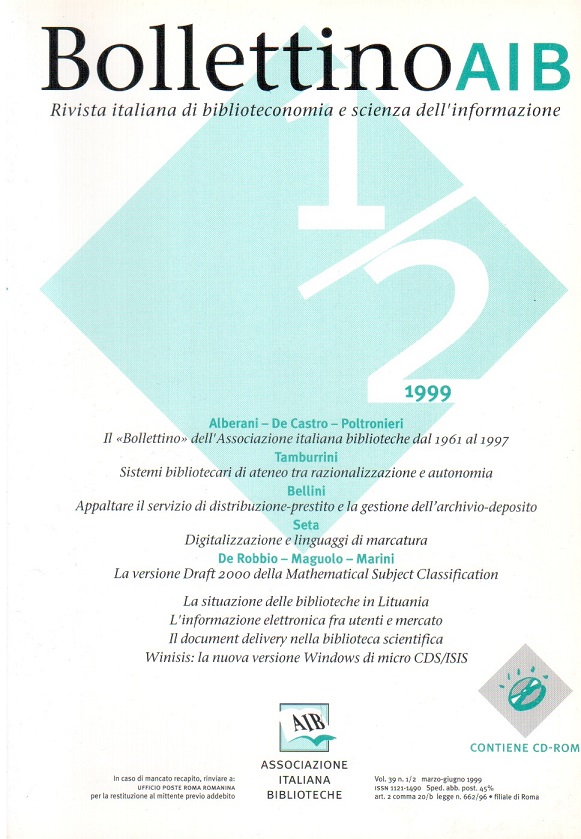Outsourcing the distribution-loan service and the stack management
Main Article Content
Abstract
Although Trento University Library had for some years partially outsourced its distribution-loan service and the management of its stacks, only in 1998 were these services, in two of the four library centres, wholly outsourced to outside companies, eliminating all the remaining staff from the sectors in question.
The principal reasons behind the 1997 decision to integrally cover these services to the public through outsourcing can be summarised thus: the percentage of payrolled staff available for such activities was minimal; it was impossible, or quite difficult, to hire new payrolled staff as a result of the government's budget provisions; the trend which had established itself in recent years to grant outside companies an increasing role in managing various services internally or on behalf of the university was recognised and approved; considerable perplexity had arisen regarding the use of university staff and outside personnel side by side in the same sectors; activities carried out, and the number and degree of complexity of the tasks; the difficult co-existence between these two types of personnel was acknowledged; finally, a specific aspect was taken into consideration, namely the planned restructuring of the library which envisaged the transformation from a closed-stack to an open-shelf library; it was also intended to create job opportunities for students of Trento University; and to verify the hypothesis that outside personnel were of equal, if not indeed, in some aspects, superior quality to payrolled staff at equal or even lower cost. These were the premises underlying the outsourcing specifications, which presuppose a detailed analysis of the concrete activities comprising these services. The notice of tender specified that the offers were to be made for the provision of the entire service to be furnished for the whole duration of the contract, thus excluding hourly-rate tenders. Nonetheless, the total annual hours of work for the supply of the service had to be approximately calculated to quantify the global cost. The tender was won by a consortium established specifically to obtain the contract.
1998 was the first year in which the reference-loan-archive service of Trento library's branches at the Arts and Central (Sociology, Law, Economics) Faculties was wholly outsourced to outside companies. Faced with the operation's several positive aspects, it is legitimate to question the precision with which some very delicate activities (for example, the annual inventory) can be carried out by non-payrolled personnel which to some extent sees itself as "temporary"; more importantly, the absence of payrolled staff from these sectors where the interaction between the library's users and its staff principally takes place risked causing a fracture between the body providing the service and its users.
Faced with these considerations, the first path to be taken is to redefine the specifications, improving them as regards both the tasks to be carried out and the minimum personnel presence. The second path is to introduce elements of quality into the tender, passing from the best-offer formula to that deemed "the most economically advantageous".
Article Details

This work is licensed under a Creative Commons Attribution-ShareAlike 4.0 International License.
